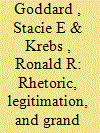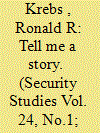|
|
|
Sort Order |
|
|
|
Items / Page
|
|
|
|
|
|
|
| Srl | Item |
| 1 |
ID:
138849


|
|
|
|
|
| Summary/Abstract |
This introductory framing paper theorizes the role of legitimation—the public justification of policy—in the making of grand strategy. We contend that the process of legitimation has significant and independent effects on grand strategy’s constituent elements and on how grand strategy is formulated and executed. Legitimation is integral to how states define the national interest and identify threats, to how the menu of policy options is constituted, and to how audiences are mobilized. Second, we acknowledge that legitimation matters more at some times than others, and we develop a model specifying the conditions under which it affects political processes and outcomes. We argue that the impact of legitimation depends on the government’s need for mobilization and a policy’s visibility, and from the intersection of these two factors we derive five concrete hypotheses regarding when legitimation is most likely to have an impact on strategy. Finally, we explore who wins: why legitimation efforts sometimes succeed in securing public assent, yet at other times fall short. Our framework emphasizes what is said (the content of legitimation), how it is said (technique), and the context in which it is said. We conclude by introducing the papers in this special issue, revisiting the larger theoretical stakes involved in studying rhetoric and foreign policy, and speculating about how changes in the technologies and sites of communication have, or have not, transformed legitimation and leadership in world politics.
|
|
|
|
|
|
|
|
|
|
|
|
|
|
|
|
| 2 |
ID:
138853


|
|
|
|
|
| Summary/Abstract |
Franklin Delano Roosevelt was, by all accounts, a master orator. Yet success eluded him as he sought to make his fellow citizens aware of the threat Nazi Germany posed and to banish isolationists to the illegitimate margins. At other times, however, Roosevelt’s campaigns to shift the underpinnings of national security debate were more effective. Notably, his definition of the adversary as the Nazi regime, rather than the German people, deeply shaped public discourse during the Second World War. This article explains the uneven results of Roosevelt’s narrative projects—and those of other presidents—as a product of the intersection of the rhetorical mode he adopted and the rhetorical demands of the environment. During unsettled times, public demand for storytelling is elevated, and presidents who seize that opportunity can shape the narrative landscape and thereby policy. Presidents who fail to align their rhetoric to the moment—such as Roosevelt offering predominantly argument during these critical junctures—allow alternative narratives to proliferate. More broadly, this article offers an account of the structuring of legitimation in the national security arena.
|
|
|
|
|
|
|
|
|
|
|
|
|
|
|
|
|
|
|
|
|